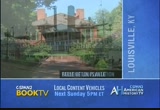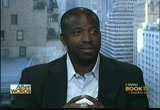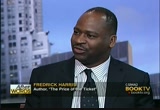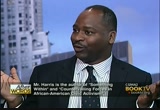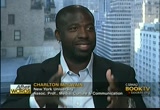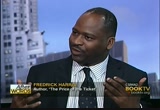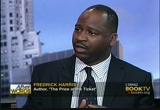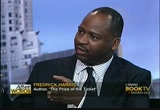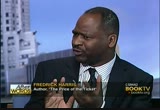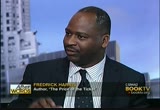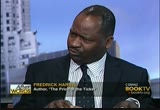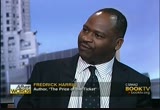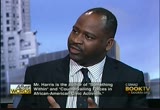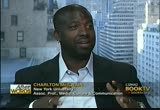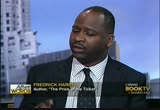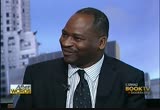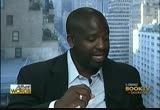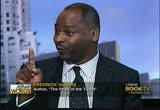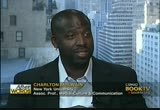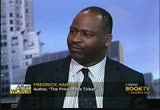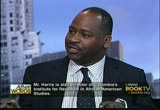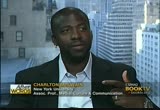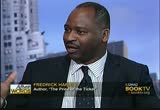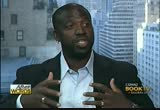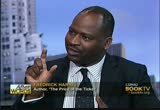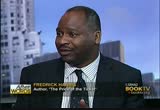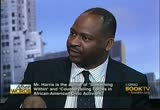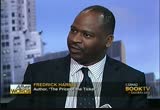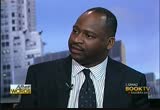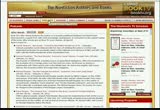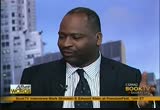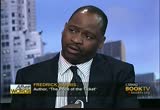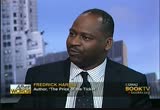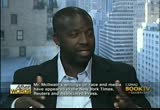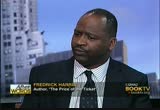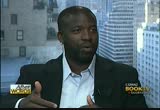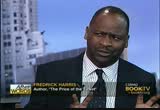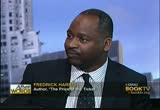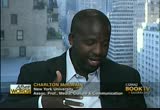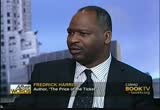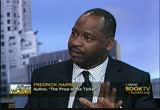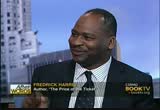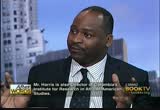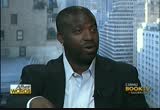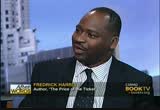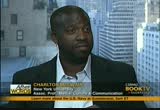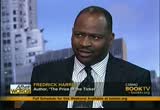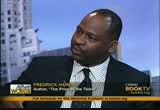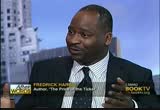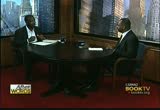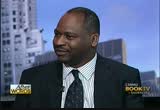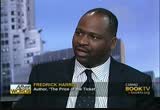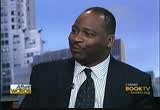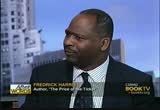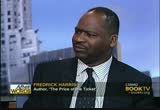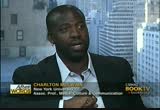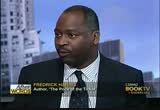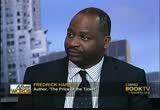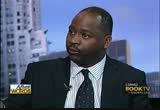tv Book TV After Words CSPAN July 30, 2012 12:00am-1:00am EDT
12:00 am
>> up next on book tv, after word with guest host, charlton mcilwain. this week, fredrick harris and his latest book "the price of a ticket to." the columbia professor says bronco's ascension to the president sit undermindded the civil right movement to race neutral politics. >> host: from the very beginning, tell me in a nutshell, what is this book
12:01 am
about. >> guest: the book is about many things but primarily what it's about is an examination of black politics in the age of obama, and one of the curiosities that really motivated me to write this book is actually a piece that was written in "the new york times" magazine. during the summer of 2008. and the title of the article was "the end of black politics." and it provided a generation explanation why you see this crop of black politicians who are running a diffuse campaign, and so i think i wanted to have my say as one who had been writing about this for decades. and this book, it's providing historical context the rise of barack obama, and looking at the various campaign strategies that racially neutral black politics -- black politicians
12:02 am
have been using, and talk about the consequences of those strategies for present-day black politics. >> host: you would say it's more than about obama, though. he is a stroll figure, kind of instigated -- >> guest: it's way, way a lot more. i think history is very important to sort of figuring out what's going on at the moment. and so not only it's about what a grounding the rise of obama within history, i talk about shirley chisolm, jesse jackson, chicago politics, starting way back in 1928. with the first black congressman from the south side of chicago, and i talk about these ideological fissures in black -- this long history about the politics of resuspectability, looking at the need of black elite to raise up what i would
12:03 am
describe the untalented 9/10th s in the black community to put a positive face to white america about racial progress, and so the rise of obama is within all these contexts, and sort of explains the 2008 race and what obama did as a candidate, particularly when he faced issues of race. it has to be anchored in these trends, the ideological trends developing within black communities and the history that the rise of his campaign came out of. >> host: tell me, before we get into the details of the book, which you spell out nicely there -- we're going to touch on most of those. tell me about what it was like to write the book to do the research for it. you make note that you're a political scientist. >> guest: right. >> host: often political
12:04 am
sciences have numbers -- what was it like for you to look back at historical context. >> guest: that's an excellent question. this was a very different book for me to write. i'm pretty much a conventional political scientist. i run statistical models. i do survey mark. i may do a little ethniccography as i did in my first book on the black church but i'm looking for statistical rigor and theoretical contributions. but i really felt in many ways that the work that i've done hasn't really spoken directly to issues i think are important to black politics, and i think it's really crucial at this moment because i think there's a lot of amnesia going on about what those political struggles meant for black communities. and so it was inspiring in many ways, and a little bit fun, to
12:05 am
sort of go and to think back decades before. to delve into the history to sort of put together the interesting characters in places like chicago and plenty of characters i couldn't write bat because i didn't have the space. but a really fun book to do and got me out of being the normal political sort of normative neutral political sign 'tis. >> host: you start in chapter one talking about the idea of the class. tell us about what that is, what is the primary distinction or fissure in black politics in this chapter. >> guest: the big difference -- i want to be clear, just not black politics. specifically black electoral politics because flight mid-1960s, when we have discussions about voting rights
12:06 am
and the voting rights bill, black leaders, black inspection people talk about what their vision of what black people in politics should -- intellectual politics should look like. on one side you had malcolm x and his famous speech, the ballot or the bullet, where he talks about black voters shouldn't be taken for granted. there should be community centered issues that mattered no matter what the color of the politician is, and so -- and those politicians should be held accountable based on what they did or did not do in the interests of the community. on the other side you had a more coalition focus perspective by ruston in a famous essay in the mid-1960s, and he really was trying to steer the protest movement into electoral politics as a part of the black voters
12:07 am
becoming part of the democratic party coalition. from southern voters coming in, and northern black voters who are already pretty much electorally active within a political party, and so that vision of coalition politics included the idea that issues, concerns, should be in many ways a universal perspective, and that blacks should join coalitions with labor unions, with religious organizations, to provide policies that would be very important. not that he gave up on antidiscrimination legislation and didn't see the importance of that but this has been the big clash, and this clash as we see in this first chapter, is in many ways crystallized with shirley chisolm running in 1972.
12:08 am
there's tensions between the independent black politics and the coalition focus. she announces her campaign in brooklyn at a church. i'm not the candidate of the black folks. i'm not the candidate of women. i'm proud to be both. i'm here to serve the interests of the people. and so she was thinking in coalition terms. but when she went to -- she didn't do very well. >> host: i want to ask you to back up. one of the things that catches my eye in this chapter is that back story. so, take us back to 1971, chicago hotel room, where this meeting convenes. >> guest: right. this is a fascinating story. almost like a mystery movie. what you have is a secret meeting that happened in chicago. 1971. and you have black and who it officials, mayor hatchard of
12:09 am
gary,na indiana, is part of this julian bond. over 100 black elected officials meet outside of o'hare -- nero hair airport out of chicago, and what you have is guards posted because they don't want the media involved. people ducking into elevators, and they're going there to deliberate on the need to run an african-american for president. there's some people who are opposed to it. some people who are for it. some people think there's a better strategy. pick the most liberal and viable white candidate who will be accountable to the black community if he is elected. you have some people saying, well, no, we should -- jesse yackson, 1971. some said, no, we should run a
12:10 am
black candidate. and then we know that person's going to win but we want to use the votes -- the delegates that are accumulated as leverage at the community so we can get patronage, policy issues that are important to us. and so all of this leads the next summer, in 1972, to the national black political convention in gary, indiana. you have black delegates trying to negotiate policy positions, some of the stuff is universal policies, like healthcare, and brach barack is part of this, it's nation time, it's nation time, it's nation time. so you have this grassroots evidence to place blackishes on the electoral agenda in national politics, and so what we have
12:11 am
here is shirley chisolm, who doesn't go to that meeting at o'hare airport -- near near o'he airport. >> no one else got selected. >> they cooperate come -- couldn't come up with a candidate. and also tensions about brokering, people have interest by going with a political candidate because they might personally benefit from their association. so, there was a lot of brokering going on. but shirley sort of hop-scotched over atlanta and when she announced she is running, some did it, to keep some opeople opposed to her, particularly the men, who were very sexist, black politicians in particular who felt that a black man should be the first to run in the democratic primary. but there are lessons learned from that experience, and she talked about those, and what is important, it laid the foundation for jesse jackson's
12:12 am
campaign and jackson's campaign, i would argue, laid the foundation 20 years later for barack obama's campaign. >> host: that's what i want to did you about, starting with shirley chisolm, who is an inspiring figure but when you look at it in terms of then cal measurements of political success, she, number one, ran without any cowboys of sanction from the black elite. >> guest: right. >> host: she was unable to get very many black delegates. when she tried, after humphrey released his delegates at the convention and the tried another play to amass delegates, she was unsuccessful there. >> guest: right. >> host: and ultimately she was unable to traps late any of that -- translate that into any kind of tappingible gains or leverage by the democratic party nominee that year. so, by all accounts she was a
12:13 am
failure. and so tell me why it is, her candidacy was so central and why it paved the why and why it was this first chapter in this story that ended up with barack obama. >> it was a failure by those measures but what it did is it gave african-americans for the first time experience in presidential politics. and so these players in the background, particularly jesse jackson, seem to crop up at key moments and post-civil rights black history. it gave them experience. they kind of knew how things were -- they learned from the failures of that experience. and also i think as shirley chisolm sadnesses her memoir was that she was the first -- not only the first african-american
12:14 am
but the first woman, and it's a disappointment in many ways nat 2008, when we had for the first time a viable woman running for president, and a viable african-american running for president, shirley chisolm was hardly mentioned by the media. the candidates themselves, but despite that she was the first. she took the sexism that came after her on the chin, as well as the racism, she, like barack obama, and jesse jackson -- i didn't talk about this in the book but she talked about it in her memoir -- her life was threatened because she was running, and wallace was shot, and she came -- got criticism. she came to his side. to offer comfort, even though ideology include they were on opposite ends. so, i think there always have to be the firsts. there were people who attempted before jackie robinson was integrated.
12:15 am
right? and so -- but we also forget those who behaved -- paved the road and made the way easier for those to come. >> host: the sacrifice. >> guest: the sacrificial lamb. >> host: i want to read the value or one of enemy this historical approach and looking through archives and bringing up the pass. you come across things that probably most people have never read or heard of out all. i want to read this quote to you. talk about chisolm, and the sexism, the racism, her ability to face that and overcome it. i want to read one of those comments from a journalist at the time. >> guest: right. >> host: her quickness and animation will leave the impression of femininity, she is not beautiful. he face is bony and angular, her nose flat and wide, her neck and limbs scrawny. her protruding teeth probably
12:16 am
account in part for harelips. still -- her lisp but in her auto buy goinggraph she describes herself the better light. i can't imagine something like that being said about hillary clinton in 2008. so maybe just say we talk about chisolm. more about what that meant to be not only the first african-american but the first woman and to take on that kind of vitriol at that time, and its influence on successes, female and black politicians. >> guest: right. here it's a great example of how shirley chisolm stands at the intersection of racism and gender inequality and tells us how far the country has gone. that was pretty much part of the course in late '60s and early
12:17 am
'7s as the women's movement is being galvanized. so i describe it in the book as a heart of darkness description of this woman. i could not imagine how -- what that meant to her psychologically, what it did to her morale. why is it that particularly during this era of black power, that you didn't have male -- you know, black males within the black community coming to her defense and making the descriptions of her like that. in fact, she has to fight two front there are other quotes in there -- chicago, we're going to get to the center of the black political barrelled but she goes the black expo in chicago on a panel about women in politics. and she basically said -- because she is taking this crap about her as a woman running.
12:18 am
she is the first black woman elected to congress so that's an important fact to know. she said, look, get off my back. this is just not about women. this is about -- we're all tied in this destiny of making progress, both black men and black women. so she had to fight both fronts. male colleagues in the congressional black caucus, when would would ask what do you think aboutshirery chisolm? shirley who? and they wouldn't respond. i think it would behoove those who are interested in addressing these issues around both race and gender, to forget the sacrifices that shirley chisolm made in that particular campaign. >> host: absolutely. absolutely. let's step ahead. another 12 years after shirley
12:19 am
chisolm, we have jesse jackson. tell me about how jackson's campaign differed from chisolm and how he as a candidate give terms of his strategy and what he thought could be accomplished at the very beginning. >> guest: right. about 1980s, in many ways, '76 is sort of a election where sort of black leaders, black voters, really get behind the governor of georgia, carter, and he gets these endorsements from people like andy young, who is the mayor of atlanta. a colleague of dr. king's, coretta scott king, and black leaders are getting behind carter because they don't want
12:20 am
another year of presidential administration with the republicans. by 1980 -- there's a year that also passes but by 1984, with the reign of the reagan administration, the rising tide of conservism and because the democratic party not oppose these policies, black folk are getting very impatient of the. they're feeling they're being taken for granted by the dem contrary creak party. there are renewed discussions from the same players in 1972, the new players because there's a new crop of black elected officials who are mayors in cities like philadelphia, chicago, washington, dc, and so people -- jesse jackson is raising the banner of independent black politics. it's our time now. we want our share. and so what we have here is a
12:21 am
split that -- we'll see later on, among those who think that this is a good strategy and those who go with sort of mondale or the regular sort of white liberal democrat. and ironically enough, most black elected officials, most members of the congressional black caucus are opposed to jackson's candidacy but there's a rising tide of black ac timism in the community. and what we have here is the idea of using the black vote, his accumulation of delegates, at a leverage to get the democratic party to respond to these progressive issues that they seem to be neglecting in behalf of black community. >> host: the jackson campaign starts in many ways like
12:22 am
chisolm's, as, one might say, symbolic effort. no one thought he would win. he himself didn't think he would win. but the effort was really about, as you say, amazing -- amazing delegates and gaining inflation in the democratic party. >> guest: and putting issues on the table, issues around the -- a primary system, runoff system in the south where, if a majority of the candidate doesn't get at least 50% of the vote, a runoff has to take place. and sort of racially for legalized electoral districts, whether congress or city council districts, this would be a disadvantage to black candidates because they would get a plurality but not a majority and when they're two on two, usually often times the black candidate
12:23 am
would lose. so if you wanted to get from -- get away from that the primary movement and the antiapartheid movement is going on at that time. and so it was using the electoral process in presidential election to set the agenda. and so, yes, it was partly symbolic but there's some substantive aspects of it in a sense. not necessarily become the first black president, but to get these issues on the agenda and on the platform and have the standard bearer of the democratic party to address those issues once they get in. >> host: do something specific targeted right at the black community, which is the essence of the independent black politics as you define it. >> guest: exactly. exactly. >> host: so, '84 to '88. what changes with respect to the
12:24 am
independence, the coalition, and what motivates jackson to run. >> guest: we have, as i said before in '84, our time now. we want our share. 1988, it's the rainbow coalition. and so you see that the tensions, the switching and the strategy -- and i have to say for jesse jackson, given his history, it was really pretty much a successful strategy in the sense that he didn't win but for a few weeks people thought he may win the primary. he won the michigan primary, for instance. overall he got 20% of the white vote. and he partly changed his strategy. he talked about those working class voters. he spoke to white working class voters about issues around plants closing, and i say this in the book but particularly the
12:25 am
speech he gave in '88, the first democrat running in the primary who spoke out for gay and lesbian rights. and so 20 years later, we'll see a different outcome in this. and so, again, it laid the platform for a very progressive coalition that would develop later on. but also he didn't get much out of it. right? and so part of the strategy is that even if you go from the coalition -- use the coalition strategy or the independent black politics strategy, you still have to say to the american people -- because black voters account for about a fifth of the democratic primary. democrats shrift and become more moderate, and so democrats have been losing in the '80s to the
12:26 am
republicans so that was a lot of soul searching in the party, the rise of the southern democrats but what jesse did here which would have implications for barack obama, he got the rules changed within the democratic party about the need for proportionate representation and allocation of delegates. this was a big issue of jesse jackson, both in '84 and '88. he thought he was being disadvantaged because the large states, for instance, hard all these rich delegates but the rules varied. you have to get a certain amount -- if you got 20% of the vote you didn't necessarily get 20% of the delegates. you got less. and so one of the part of the negotiations that the party agreed to in 1988 is, okay, we'll make across the board the process more fair. we'll make the allocation of the
12:27 am
delegates more equal. why that's important? because in 2008, when hillary clinton was winning big states like texas, california, ohio, pennsylvania, and barack obama was winning smaller states, and even though hilary won sometimes over -- wing over 50% of the vote, barack obama got a fair share of the delegate, and some estimated if the jackson rules were not in place, perhaps barack obama wouldn't have gotten the nomination in 2008. >> host: so it was very close, neck and neck. >> guest: very neck and neck. but you also have the public officials who were these special delegates and they were split on down the line, too. they were waiting to see who was going to win in this epic bat until the primary. but i think people sort of
12:28 am
forget -- and even though jesse jackson used a sort of coalition type strategy, in his negotiations, it was all about independent black politics. we have all these delegates. this is a process that is unfair to candidates in general, particularly for this campaign, and there are these other issues, so we're going to use the leverage of these mostly black delegates to get this one policy changed within the democratic party. and so poor jesse, because in 2008 he would be remembered for making those up fortunate comments on fox news, but as i say in the book, i don't think we -- you know, we shouldn't forget the movement itself. even though there may be problems with the messenger currently and perhaps even then. is that mattered. that focus on using leverage had
12:29 am
consequences down the line that i don't think jesse jackson himself could see. >> host: and which president obama directly benefited from and probably wouldn't be president maybe. >> guest: perhaps right. >> host: had it not been for that. >> guest: certainly didn't hurt. certainly didn't hurt. >> host: chisolm, jackson, multitude of black candidates in between all paved the way for barack obama's rise and ultimate election. a second we're going to get to chicago. and the crucial role that that place played expo people played. but before that we're going to go to a quickjack we'll be right back.
12:30 am
>> host: next stop, chicago. you mention in the book it was almost destiny that our first black president would come from this city. from this state. tell us a little bit about why that and is the role that chicago politics played not only in the elevation of barack obama but in terms of helping to ferret out this distinction and conflicts between independent and coalition politics. >> guest: right. as i say in the title of the chapter, chicago is the political capitol of black america, and particularly the south side of chicago. of the, what, four u.s. senators that have existed, at least since reconstruction, or of the u.s. senators we have had, most
12:31 am
of them have come from the south side of chicago. brown, senator barack obama, and then the gentleman who was put in to replace him. all african-americans. and it's really part of the paradox of the city itself in so many ways. chicago has long been one of the most racially segregated cities in america, and so it's a paradox that segregation has led to this very compact, two mostly large black communities on the west side of chicago, and particularly on the south side of chicago, that has continue continueously delivered large numbers of black votes for democratic party candidates. and so that's one of sort of the paradox of why. the other is that the role that blacks have played within the
12:32 am
democratic party machine. they rebel from the machine, particularly starting in 1970. but many, like harold washington, who went on to become mayor, started out in the daly machine, and daly was elected in the mid-1950s, and the machine itself helped to perpetrate this racial segregation, through the public housing policies, its city planning policies, where to put highways, dan ryan highway, splits the south side because one side was the majority was the black community and the other side was the majority white community, so there were efforts to contain the black population on the south side. mostly because of the efforts of the daly machine. but within the machine, blacks began to learn how the political process worked, and so many of them, like harold washington,
12:33 am
became what i describe as renegades for the machine. they used the skills, the political skills they had developed within the machine, to oppose the machine itself. and so we see again this contradiction of being the political capitol of black america but mostly because of the legacy of segregation that put all the black folks together in these neighborhoods, and also because of the voracity of the political machine and the blacks learned to oppose it. >> host: you had this concentration, which turns into considerable power or leverage, so the question is -- and the way you see it -- that what really divides is in so include, strategically, is whether or not to play the game within the machine or to oppose it. is that the -- >> guest: yeah.
12:34 am
that's part of the division. and the independents, they way i described it, is a little different. the independents i talked about in national politics, black politics, those independents who seek a community centered political agenda as opposed to the coalitions, but also coalitionists who were black in chicago, who were independent from the political machine. so we had two types of independents, who sometimes collaborated and sometimes clashed. and i can talk in a moment about where sort of barack obama fits within that tradition. but clearly because of the sort of racist nature or the dally machine, because of the long effort which i document around police brutality in the city of chicago, and being respected as
12:35 am
voters, when it came for their to elect a viable black mayor, all these forces within the black community across clarks across geography, came together to elect harold washingtonin' 1983. >> host: so you have this split that you -- maybe you can elaborate a little morement you have independent black politicians who are independent that that they're trying to game tangible policies, that benefit black americans. >> guest: and they're usually black nationalist ideology. >> host: so black nationalist strain or philosophy fuels that. on the other hand you have people who are also independents but they're independents because they're working outside of the -- >> guest: democratic chain and tend to be more coalition focused in their approach to
12:36 am
politics. >> the hyde park. >> guest: where barack obama emerged from that tradition of being separate from the machine. >> host: okay. so, harold washington, who you mentioned. tell us about where he stands from the beginning to the en. what really makes him a kind of central independent black nationalist kind of candidate? >> guest: he is more complex than that. harold washington, a brilliant politician, great orator, and he really laid it on the ground of what the implications were about that election. and he had to be virtually dragged into running. there was a whole movement prior to getting him to run. led mostly by this activist by the name of lou palmer, who i talk about in the book. a political activist and not a
12:37 am
political organizer. there's a difference and we can talk about that. and so carol washington was -- i would say was on the border between the black nationalists as well as the traditional independents because he had experience. he had tried to work in the machine, to make progress. he had grant for mayor in the 1970s. there were some sort of black machine politicians who went along with the -- the white machine candidates that way, heard washington called them the biggest uncle tom on god's green earth. so, he also saw the need to build coalitions because black voters were only 40%. he talked about the need to build coalition. however, he never let up on his criticism of racism. in the city as well as the need to dispense resources equally
12:38 am
throughout chicago. and so he is in many ways on the border between the hyde park type liberals and the black nationalist type liberals in the chicago political tradition. >> host: i want to talk about that aspect of talking about race, racial inequality. that seems to be from your point of view really the central key to the independent black politics, the idea that no matter what happened, whether trying to make coalitions or work within the community, that idea of racial inequality is center stage. >> guest: exactly. >> host: i want to read another one of these gems of a quote. that you have in the book, and this is from harold washington, and i think the setup is that he is asked basically if he embodies the good qualities of past mayors, and this is his response: there are no good qualities of past mayors to be had. none. none. none. none.
12:39 am
i did not mourn at the bier of the late mayor. i regret anyone dying. i have no regrets about him leaving. he was a racist from the core, head to toe, happy to hit, no dot but and it some people thought that the way -- that's the way they lived, just like slaves ton the maintain addition thought that's they way they were supposed to live. >> guest: right. >> host: so that's pretty -- i can't mam anyone today saying quite clearly that. >> guest: no. no. . no what's interesting is particularly david axlerod actually worked with harold washington when he ran for re-election in 1988. and often times we hear, particularly those who are talking about sort of barack obama and how he came through chicago politics, that he is basically the extension of what
12:40 am
harold washington didn't fall for, which is to some dealing he is. i like to look at he inherited the benefits of. they could not imagine those word coming out of the mouth of barack obama. when he was in chicago or of course since he has been on the national stage. but i think it's the importance because it was just not -- i mean, he is recognizing what his history was all about, but also talking about policy. talked about the incumbent who is being challengin' 1983, who does all these horrible things, policywise, and says, i'm trying to prevent jane byrne from institutionalize race simple in this grate city. right. in your face but he also went to white neighborhoods neighborhood about his vision. talked about what he planned to do. he went to latino community who were supportive of his campaign.
12:41 am
and it was because of that coalition -- now, the coalition -- you know, it was almost like the rainbow coalition, you know. lots of blacks but few other colors. but he was able to, with the black mostly coalition, and browns -- latino population was relatively small in chicago -- and a few white liberals put him over the 50% mark. and most of the white voters in that city voted by not staying with the democratic party. they went with independent white candidates who were democrats. dee ran as an independent against the party. this is how much revolt was going on. then there were the council wars that went on. and looked like what prepare prepare is -- president obama is going through with the republicans today. i didn't think about that until
12:42 am
now. so he had a hard row to hoe in navigating that environment but he did not ever let up on issues regarding the need to challenge racism when it occurred and the persistence of racial inequality that exits in that city. >> host: so he did lament the fact that, tend of his campaign forks all the work he did and all the trying, that coalition, particularly with whites, was minuscule. he hoped it would be much more broad-based. >> guest: i guess the story from david axlerod. in the interview he had done in some newspaper story, he talked about working with harold washington, and how he and others were so excited in 1988 when they got 20% of the white vote. right. harold washington -- when most people in -- most white people
12:43 am
identifying in chicago as democrat, and they did a lot -- almost -- not quite double but almost double what they did in 1983. and harold washington, who spent 90% of his anytime white neighborhoods trying to convince white voters to vote for him said -- i won't say it on public decision -- or c spain, ain't it a -- to be a black man in america. if you lay that aside, got up the next morning, gave a great speech, told people how great chicago was and he was ready to serve another year. and this ills 1987. unfortunately months later, i'll never forget it in november of 1988, he died of a heart attack. >> host: skip ahead a few years, carol mosely brown.
12:44 am
she sets tout build the same type of coalition harold washington wanted and she is the most successful among whites. did she do that at the expense of talking about racial inequality? >> guest: she didn't run airplane from -- run away from it. in 1992 she built a coalition beyond the city, and she had been a cook countywide elected official so he gained the support of many white voters. but the suburbs outside -- several suburbs, particularly northern part of chicago, called collard county, and there, because of what was happening around the confirmation of clarence thomas, and the outcry from the sexism -- the accusations of sexism going on, many women voters in the collard county ran because she ran on issues around issues of sexism,
12:45 am
gender inequality, but she also had a base on the south side -- she is also from the south site of chicago -- around issues and maybe she didn't talk about it as much but carol mosely brown never ran away from issues when it came to racial inequality. so that was her record there but she built on the coalitions that harold washington built on, and so you could see the progression, right? and we'll talk about how barack obama builds on the tradition and went far beyond what harold washington did, as well as carol mosely brown done in getting white voters. >> host: let's go there now. so, tell us -- put this in context. barack obama, who there is during much of this time. you mention he is out there doing a voter registration drive that benefits care --
12:46 am
>> guest: when she first iran in '92. >> host: so put obama in context of washington, of carol mosley braun, and then how his relationship with independent black politics, coalition, black politics, transformed as he began from that city and local stage to the national stage. >> guest: there's a lot going on there he runs for congress against bobby rush, who is community center black nationalist independent, gets squashed. doesn't win. he talks about sort of the need to build coalitions, which is true, and overwhelmingly black congressional district in a racially pollarrized city. and so you have that. but there's also some other -- as i talk about -- it's not just where he fits among the independents, which i think is important but there's a guy,
12:47 am
fellow named samuel jones, who is president of the illinois senate. he has been in the trench. comes out of the machine, you know. i personally met him because i did some redistricting work for the illinois senate. as a consultant. he is a great guy. he is sort of chain-smoker, you know, wheeler and dealer. >> host: that picture we have -- >> guest: right. right. and he is -- he comes out of that tradition. and barack obama sort of links up with jones, and jones gives him the baton on key legislative measures, you know, around healthcare, around issues of criminal justice reform, around funding for education, that he uses as a base to run in the primaries for u.s. senate.
12:48 am
right? from this sort of old-school, black machine, politician, who had been there starting in the illinois house of representatives, at least in the early '7s, so this guy paid his dues, and other black politicians who were -- most of them independent black politicians. they become sort of jealous of what barack obama had been given and they feel like he hadn't paid the dues. what is key -- this is -- try to tell part of the story in the book -- even though jones is working in the background, right? okay, labor union folks, you want some key legislation? you know, we don't want -- i want to get some endorsements. i want it to see some campaign contributions. so, while he is out there, you know, bringing everybody together, you know, blacks and
12:49 am
whites together, you know, brown people, all together, running for the u.s. senate, you have e-mail jones, you know, who is a brilliant politician in that tradition, you know, making it happen, and so it's a very -- chicago is complicated with lot0s characters -- very complicated story, and that rich story about, we have here sort of a traditional black that comes out of the machine tradition, pushing the leverage of black power with his hand in order to make it happen for the coalition driven politician get to the other stage. >> host: these are not working mutually exclusively. it's sort of one in, helping the other, both to try to make some gains in terms of influence and power. >> guest: right. at least in that chicago moment.
12:50 am
>> host: yeah. >> guest: on the national stage, aisle i'm not sure if that's always the case. >> host: you make the point that at this time he's running for senate. and the legislature, and when he is carrying the water on a lot of the legislation, he is talking about race. talking about criminal justice and talking about racial profiling, talking about black inequality. and then as it becomes clear his popularity in 2004, and the convention speech, and then even closer, as he gets ready to run, you see a kind of decline in this kind of race talk. >> guest: right. it's interesting. i end a chapter on chicago with the scene of barack obama the day after he captures the nomination for the u.s. senate. and you know, you feel that he
12:51 am
is sort of uncomfortable with himself becoming a rising star. concerned about, need to spend time with my family. i can't go to every naacp freedom fund dinner. i could do what i can do. i don't think it's incompatible for me to represent black interests in the senate and be the u.s. senator from illinois. right? and so something happens once he gets to washington. and you see that he is trying to build this national profile, and in order to do that, because -- i mean, as i document in the book, particularly in the chapter what i called wink, nod, and vote -- that this idea about sort of running race-neutral candidacies for majority white
12:52 am
voters, is nothing new. we saw this in the 1980s in campaigns in new york, seattle, washington, all kind of cities, and so there was this sort of idea that you can't talk about race. you can talk about racial unity but not specific policies, and then the idea that black voters kind of understand this because they have to do the wink and nod. i know what you're doing. wait until you get in i think that ration until can be detrimental. i talk aboutna that in the context of clarence thomas who did a lot of winking and nodding. >> host: putting clarence thomas -- you were saying the same thing, the same relationship with black voters and black candidates was going on. >> guest: on a case of this nominee.
12:53 am
it's a fact -- people would like -- don't know, for instance, that miya angelou wrote a favorable op-ed piece endorsing clarence thomas on the supreme court because she thought any black person who grew up in the rural south couldn't possibly be that conservative, and it may take time for him to sort of come through. she talks about, if black people, we should rely on the ancestors wisdom on this one. right? and she should support this man and i support him. and as i say, the ancestor -- they're thought objects he got in. >> guest: he would change. people did they really know the -- the record was there but thity -- the idea that it's better to have a black conservative than a white conservative because you think a black conservative at least
12:54 am
would be sensitive on the racial issues. the point is that policy or policy stance on key issues affecting black communities took a back seat to the more symbolic idea that there should be a black person replacing thurgood marshall on the supreme court, even though marshall, and clarence thomas are ideology include opposite. and so, you know, that was some trepidation among black -- if you go back and look at the transcript of what people were saying in support, black folk, in support of clarence thomas. he can be a role mold for black youth. you know. he will be supportive on criminal justice issues, you know. and he gave them the signal that he would do this. right? one line he gave during the
12:55 am
nomination about, everytime i see prisoners, you know, for the grace of god there go i. right? and then the high-tech lynching. the winks and nods. it was a disaster. in the chronicles of the history of black politics in this country, because suffered the consequences of these decisions we're living with today. >> host: similarly then, want to go to you central and probably most controversy statements about barack obama. your central arming that this shrink nod that barack obama had with the black community has made it difficult for him to think about and champion targeted -- race-targeted, black-targeted legislation.
12:56 am
>> guest: it's a twofold story or twofold process. it's rick for african-americans, leaders and voters, who are concerned about issues of racial inequality so place the issue on the agenda. because of the racially diffuse nature of his style of governing. he simple my is not going to talk about it -- and black voters are okay with that because they know detractors are going to use it against him. so in the end we have mostly universal policies that help everyone, and health care is a very important policy accomplishment. a fifth of african-americans are uninsured. but when it comes to promises he made -- and i know we're running out of time cut he provided a bold plan when he was down with black voters in 2007, at a speech he gave at howard university on criminal justice reward. we haven't heard anything about
12:57 am
those since. mostly because black voters have not held his feet to the fire on these issues. like other con constituency. the gay and lesbian community, immigration reform, didn't get the dream act but got deportation. never let up on those issues, and so for black voters and black leaders, there's been the tendency to protect the president, but not pressure him into action on these very important issues. >> host: so, president obama and the voters, black voters in particular, are almost equally responsible for this. >> guest: yes. this is the part -- representative democracy. people organize about issues that are important for them. you can't wait and sit back and wait for any politician to act in your interest. you have to ask them what you want, and if they don't give it to you, you have to pressure them into doing it. >> host: a lot of people will
12:58 am
look at the title of your book, particularly the decline of black politics, and ask this question: hasn't the decline of black politics long happened? didn't it begin long were barack obama. >> guest: ed did and i talk about that at about in the book. i think it crystallized during the clinton years, actually, on very important policy issues that were implemented. unfortunately. like welfare reform. and restructuring. and the black leaders and black voters to challenge those on those grounds, but i'm looking for the revival of black politics because the other part of this -- the title of this book, which comes from james bald win, is the price of the ticket. so the price of the election of barack obama as the first black president, is silence around very important issues, around
12:59 am
racial inequality. at least with clinton you get the idea, we're going to have a national conversation about race. you can't even have a conversation about race around anything, and so the symbolic -- this is the price. the price of the ticket. and like baldwin, i don't think this country can ever give up on discussing the legacies of racism in this country, the persistence of racism in the country, and by not talking about it, not raising the issue on the national level, on the state level, and local level, i think it's detrimental for those who are interested in pushing policies that would challenge those policies. >> host: last question. how do we get there? if barack obama gets a second term, is the price of the ticket different potentially? is there a way that either he or black voters' in terms of what
153 Views
IN COLLECTIONS
CSPAN2 Television Archive
Television Archive  Television Archive News Search Service
Television Archive News Search Service 
Uploaded by TV Archive on

 Live Music Archive
Live Music Archive Librivox Free Audio
Librivox Free Audio Metropolitan Museum
Metropolitan Museum Cleveland Museum of Art
Cleveland Museum of Art Internet Arcade
Internet Arcade Console Living Room
Console Living Room Books to Borrow
Books to Borrow Open Library
Open Library TV News
TV News Understanding 9/11
Understanding 9/11